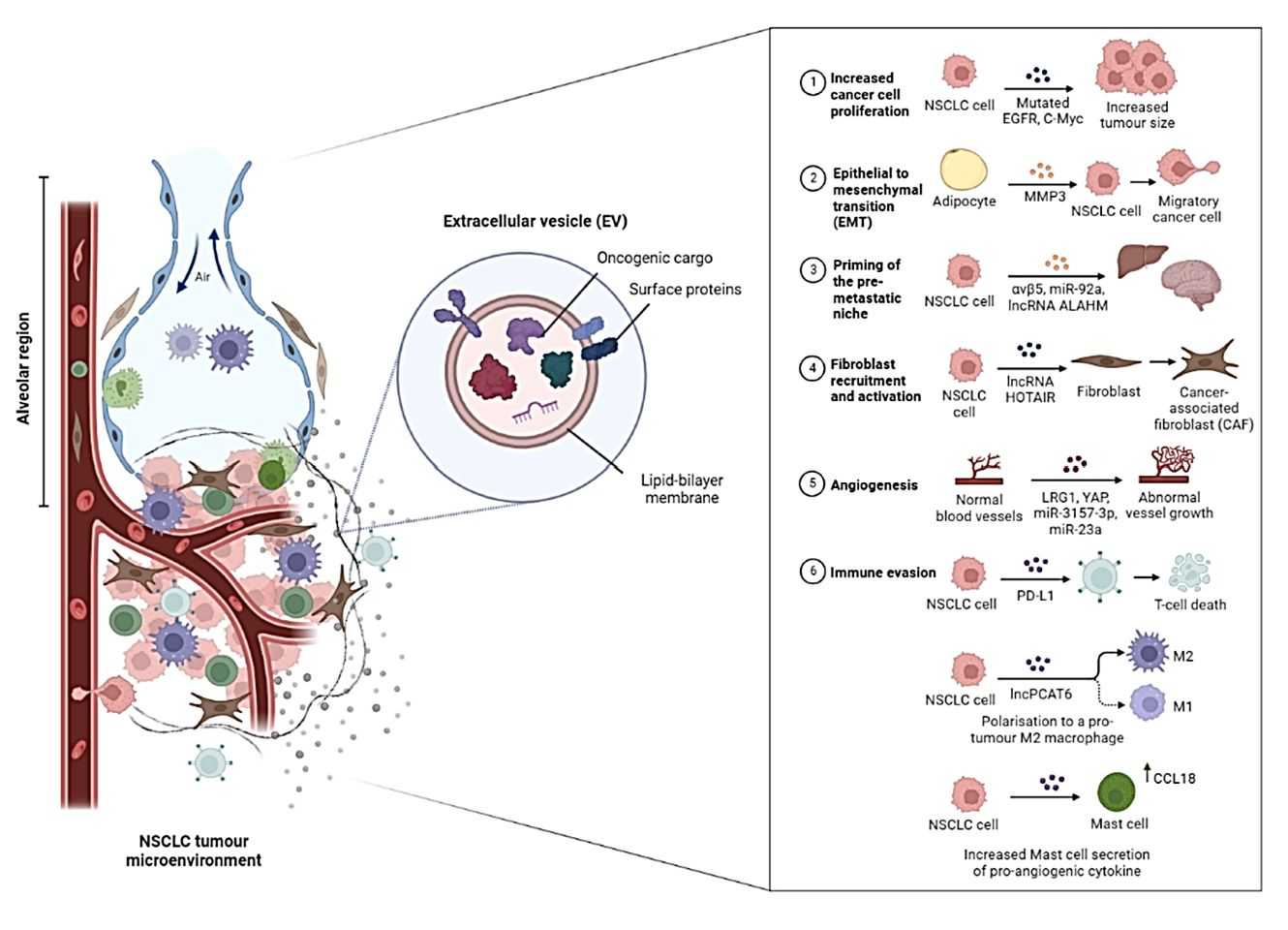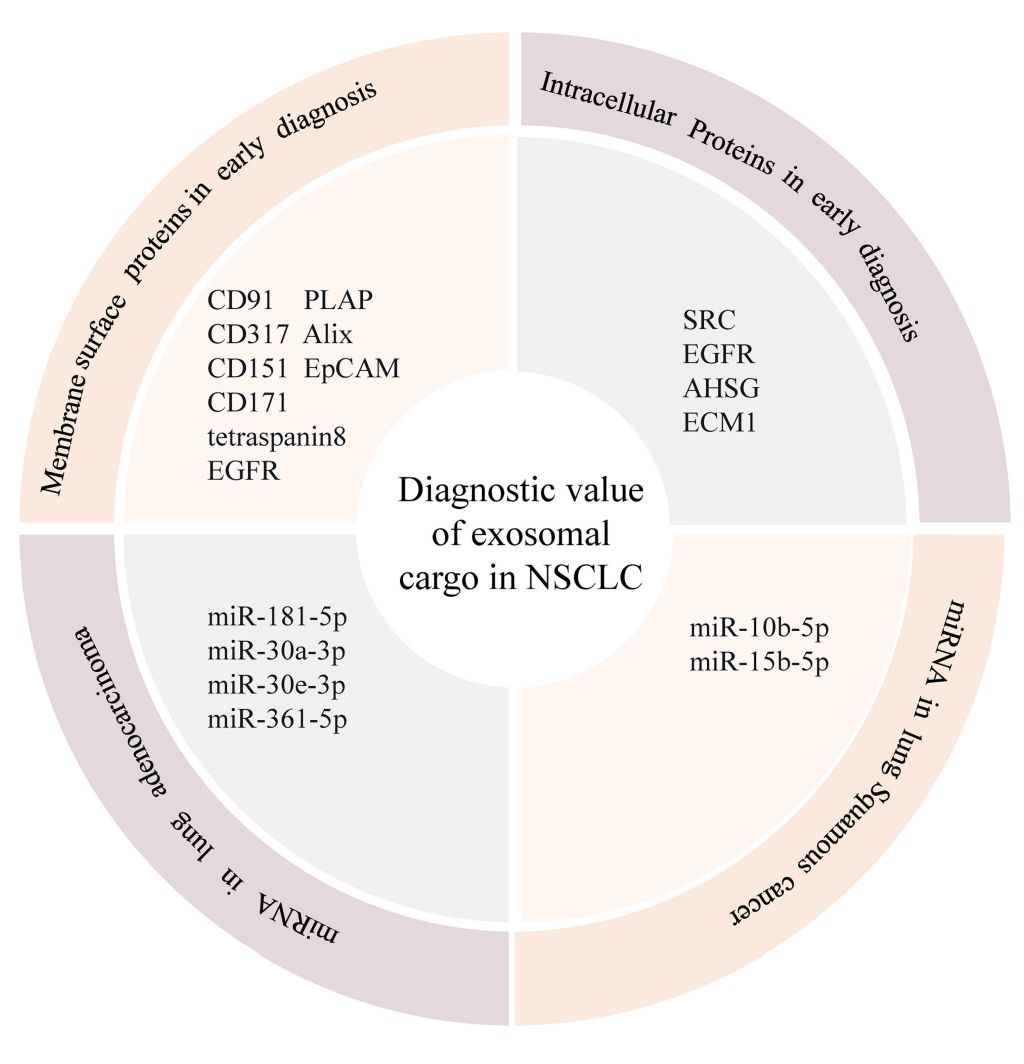Exosome Research in Human Non-small Cell Lung Cancer
Non-small cell lung cancer (NSCLC) is the most common brain metastatic tumor with high morbidity and mortality. Surgical resection, chemotherapy, and radiotherapy are the main treatment modalities for NSCLC, but the therapeutic effects are poor. In addition, the mechanisms underlying the development, progression, and metastasis of NSCLC have not been fully elucidated. Exploring the pathogenesis of NSCLC to find potential prognostic biomarkers and therapeutic targets is imminent.
It is widely accepted that tumorigenesis and metastasis depend on the interaction between tumor cells and the tumor microenvironment (TME). As essential mediators of intercellular information transfer, exosomes play unique functions in regulating tumor growth, invasion, and metastasis and supporting angiogenesis. Therefore, it is worthwhile to further explore the action mechanisms of exosomes in NSCLC progression.
Regulation of NSCLC TME by Exosomes
TME refers to the tissue surrounding a progressing tumor and includes the extracellular matrix (ECM), fibroblasts, blood vessels, immune cells, and signaling molecules. Exosomes are released by NSCLC and TME-associated cells and facilitate cancer growth by mediating messaging to alter the tumor environment. In NSCLC, exosomes promote angiogenesis and alterations in the immune system, creating a pro-tumor inflammatory environment and promoting the immune escape of cancer cells.
 Figure 1. The role of exosome in the NSCLC tumor microenvironment. (Mullen S, Movia D., 2023)
Figure 1. The role of exosome in the NSCLC tumor microenvironment. (Mullen S, Movia D., 2023)
The Role of Exosomes in NSCLC Liquid Biopsies
The main reason for high mortality in NSCLC patients is late diagnosis. Therefore, there is a need to find relevant biomarkers for early diagnosis of NSCLC. Liquid biopsy is a noninvasive test based on molecular diagnostic techniques. Exosomes are promising liquid biopsy tools as biomarkers for NSCLC. Exosomes are present in most body fluids, with high stability and high similarity of the contents to the parental cells, reflecting the genetic material and information of the parental cells.
 Figure 2. Diagnostic value of exosomal cargo in NSCLC. (Rao DY, et al., 2023)
Figure 2. Diagnostic value of exosomal cargo in NSCLC. (Rao DY, et al., 2023)
- Exosome Protein Markers
Exosomes contain a variety of protein components that are closely related to the early diagnosis and prognosis of lung cancer. Currently, several characteristic exosome membrane proteins (e.g., CD91, CD317) can be used as diagnostic biomarkers for lung cancer. Exosomal membrane surface proteins such as EGFR, placental alkaline phosphatase, epithelial cell adhesion molecule (EpCAM), and Alix can be used as potential prognostic markers. In addition, high levels of α-2-HS-glycoprotein (AHSG) and extracellular matrix protein 1 (ECM1) are expressed in exosomes of NSCLC patients, which have potential diagnostic value.
- Exosomal Nucleic Acid Markers
Exosomal RNA in lung cancer patients is closely related to the biological characteristics of lung cancer. In recent years, a large number of reports have shown that exosomal miRNA can be used as a potential diagnostic marker for lung cancer and an indicator for evaluating patient prognosis. The research found that increased miR-21 expression is associated with poorer prognosis in NSCLC patients. Up-regulation of miR-500a-3p, miR-501-3p, and miR-502-3p is associated with improved overall survival of lung cancer patients and has great potential as an early diagnostic marker for NSCLC.
Exosome-based Therapy Strategies for NSCLC
1) Inhibition of EV Biosynthesis and Secretion
Exosome-mediated intercellular communication may be inhibited at the biogenesis and secretion levels. Research has found that exosome transport is regulated by proton pump inhibitors and microenvironmental pH, and that proton pump inhibitors induce cytoplasmic acidification in tumor cells, leading to exosome retention. Another strategy to inhibit exosome biogenesis is to target factors that regulate exosome transport in cells, thereby blocking tumor cell growth. However, targeting specific classes of exosomes based on biogenesis may have short-term effects and lead to potential resistance to the inhibitor.
2) Targeted Exosomes
Targeting exosomes or cargoes that play essential roles in mediating intercellular communication. For example, monoclonal antibodies against the exosomal markers CD9 and CD63 target circulating exosomes of breast cancer cells in a mouse xenograft model, leading to a significant reduction in metastasis to the lung. In addition, exosomal cargoes essential for involvement in signaling can be directly targeted by genetic or pharmacological inhibitors.
3) Engineered Exosomes as NSCLC Drug Delivery Vehicles
The use of exosomes as carriers to deliver chemotherapeutic drugs or tumor suppressor molecules to tumor cells is promising. Exosomes are naturally produced by cells, stable in body fluids, biocompatible, less immunogenic/toxic, and, essential, can cross the blood-brain barrier. As a result, exosomes have begun to be modified to enhance their targeting and cargo delivery capabilities to inhibit NSCLC tumor growth and progression. Modified exosomes can be loaded with miRNA/siRNA or pharmaceutical agents, for example, researchers have shown that exosomal delivery of lnc-LOC85009 to docetaxel-resistant NSCLC cells increases susceptibility to docetaxel-mediated apoptosis.
Whether you're researching exosome function, evaluating biomarkers, or designing engineered exosomes for therapeutic use, you can advance your research with our high-quality purified exosomes.
| Cat No. | Product Name | Source |
| Exo-CH02 | HQExo™ Exosome-A549 | Exosome derived from human non-small cell lung cancer cell line (A549 cell line) |
| Exo-CH19 | HQExo™ Exosome-NCI-H975 | Exosome derived from human lung carcinoma (non-small cells) (NCI-H975 cell line) |
| Explore All Exosomes Isolated from Human Non-small Cell Lung Cancer Cell Line | ||
Creative Biostructure is committed to providing high-quality exosome products to help clients develop new treatments for NSCLC. Our commitment to excellence in biological research ensures that our products meet the highest standards of quality, providing researchers with valuable research tools to make breakthrough discoveries in the fight against cancer. Please feel free to contact us to unlock the potential of exosomes in the diagnosis and treatment of NSCLC.
References
- Mullen S, Movia D. The role of extracellular vesicles in non-small-cell lung cancer, the unknowns, and how new approach methodologies can support new knowledge generation in the field. Eur J Pharm Sci. 2023. 188: 106516.
- Rao DY, et al. Role of exosomes in non-small cell lung cancer and EGFR-mutated lung cancer. Front Immunol. 2023. 14: 1142539.
- Pandya P, et al. Extracellular vesicles in non-small cell lung cancer stemness and clinical applications. Front Immunol. 2024. 15: 1369356.